Critical Success Factors in Project Management: Client Impact Analysis
VerifiedAdded on 2022/09/18
|70
|18192
|31
Report
AI Summary
This report provides a comprehensive analysis of critical success factors (CSFs) in project management, with a specific focus on the UK hotel industry. The research investigates the impact of client needs and expectations on project outcomes, aiming to identify key factors that contribute to project success or failure. The report includes a detailed literature review, exploring project definitions, stakeholder perceptions, and the traits of successful project managers. It also examines business strategies, frameworks for defining business performance, and the limitations of existing models. The methodology section outlines the research philosophy, approach, design, data collection techniques, and analysis methods. The findings and analysis section presents quantitative data, while the conclusion and recommendations offer strategies for enhancing project success. The report also includes a personal development plan and references.
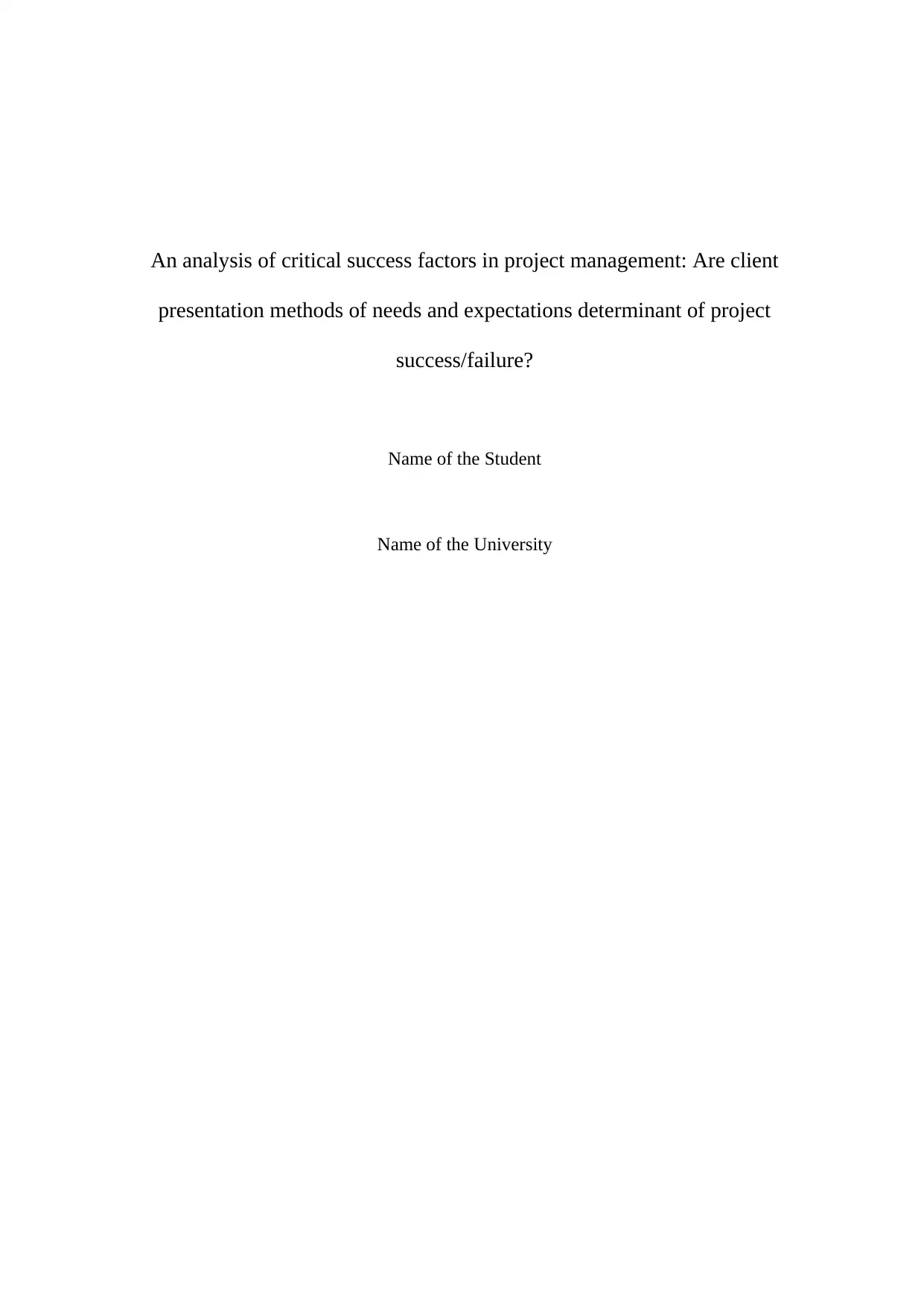
An analysis of critical success factors in project management: Are client
presentation methods of needs and expectations determinant of project
success/failure?
Name of the Student
Name of the University
presentation methods of needs and expectations determinant of project
success/failure?
Name of the Student
Name of the University
Paraphrase This Document
Need a fresh take? Get an instant paraphrase of this document with our AI Paraphraser
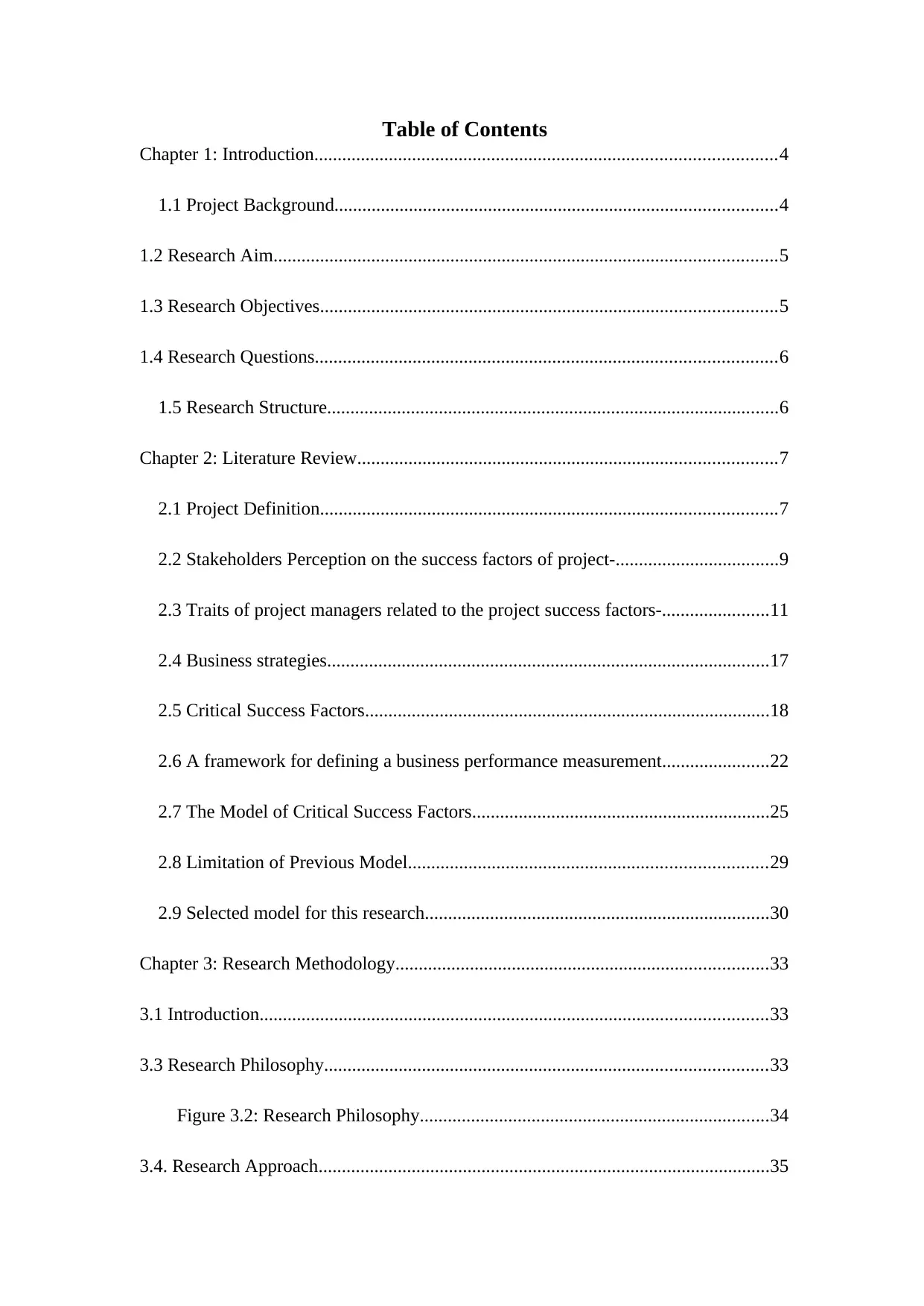
Table of Contents
Chapter 1: Introduction...................................................................................................4
1.1 Project Background...............................................................................................4
1.2 Research Aim............................................................................................................5
1.3 Research Objectives..................................................................................................5
1.4 Research Questions...................................................................................................6
1.5 Research Structure.................................................................................................6
Chapter 2: Literature Review..........................................................................................7
2.1 Project Definition..................................................................................................7
2.2 Stakeholders Perception on the success factors of project-...................................9
2.3 Traits of project managers related to the project success factors-.......................11
2.4 Business strategies...............................................................................................17
2.5 Critical Success Factors.......................................................................................18
2.6 A framework for defining a business performance measurement.......................22
2.7 The Model of Critical Success Factors................................................................25
2.8 Limitation of Previous Model.............................................................................29
2.9 Selected model for this research..........................................................................30
Chapter 3: Research Methodology................................................................................33
3.1 Introduction.............................................................................................................33
3.3 Research Philosophy...............................................................................................33
Figure 3.2: Research Philosophy...........................................................................34
3.4. Research Approach.................................................................................................35
Chapter 1: Introduction...................................................................................................4
1.1 Project Background...............................................................................................4
1.2 Research Aim............................................................................................................5
1.3 Research Objectives..................................................................................................5
1.4 Research Questions...................................................................................................6
1.5 Research Structure.................................................................................................6
Chapter 2: Literature Review..........................................................................................7
2.1 Project Definition..................................................................................................7
2.2 Stakeholders Perception on the success factors of project-...................................9
2.3 Traits of project managers related to the project success factors-.......................11
2.4 Business strategies...............................................................................................17
2.5 Critical Success Factors.......................................................................................18
2.6 A framework for defining a business performance measurement.......................22
2.7 The Model of Critical Success Factors................................................................25
2.8 Limitation of Previous Model.............................................................................29
2.9 Selected model for this research..........................................................................30
Chapter 3: Research Methodology................................................................................33
3.1 Introduction.............................................................................................................33
3.3 Research Philosophy...............................................................................................33
Figure 3.2: Research Philosophy...........................................................................34
3.4. Research Approach.................................................................................................35
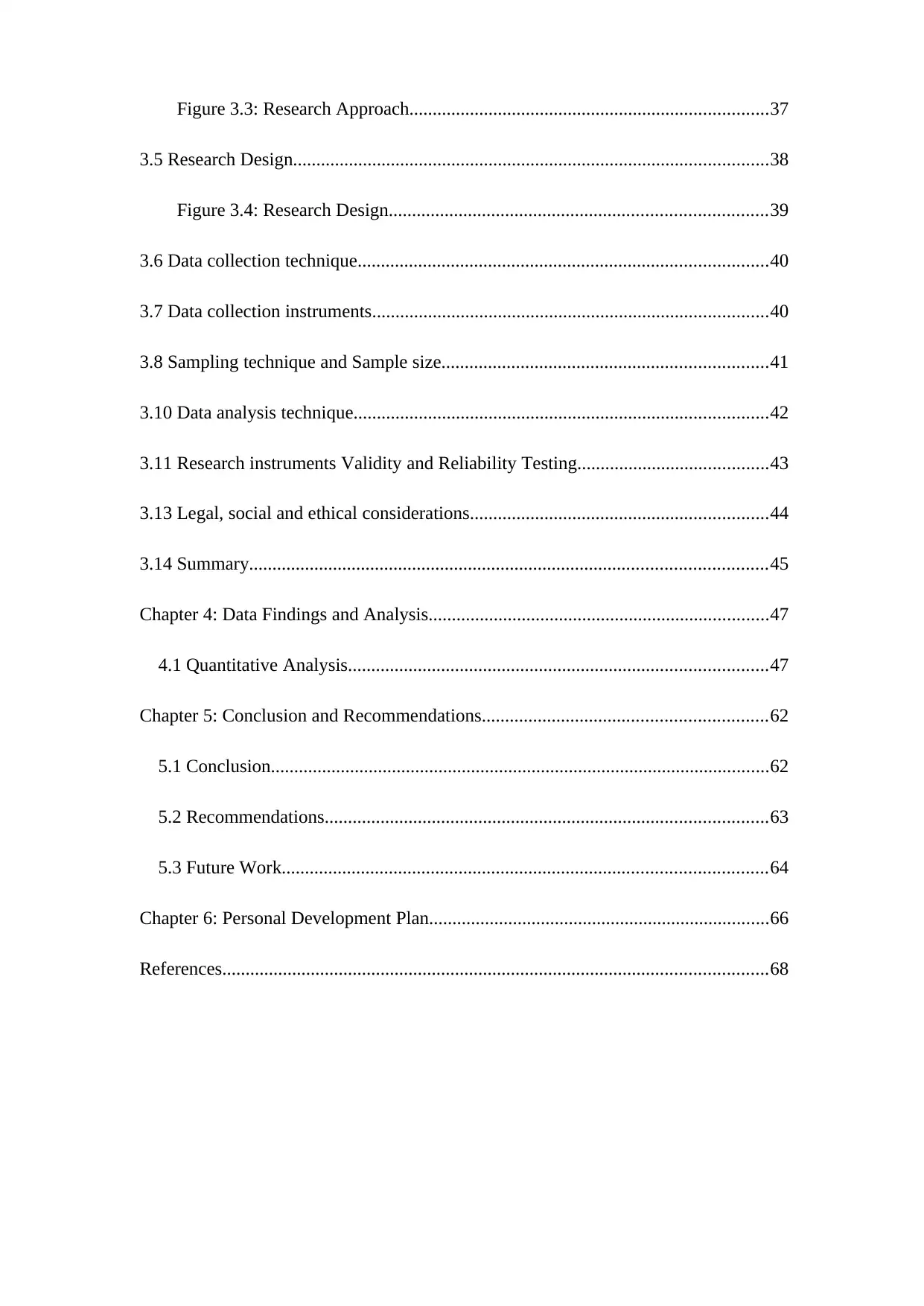
Figure 3.3: Research Approach.............................................................................37
3.5 Research Design......................................................................................................38
Figure 3.4: Research Design.................................................................................39
3.6 Data collection technique........................................................................................40
3.7 Data collection instruments.....................................................................................40
3.8 Sampling technique and Sample size......................................................................41
3.10 Data analysis technique.........................................................................................42
3.11 Research instruments Validity and Reliability Testing.........................................43
3.13 Legal, social and ethical considerations................................................................44
3.14 Summary...............................................................................................................45
Chapter 4: Data Findings and Analysis.........................................................................47
4.1 Quantitative Analysis..........................................................................................47
Chapter 5: Conclusion and Recommendations.............................................................62
5.1 Conclusion...........................................................................................................62
5.2 Recommendations...............................................................................................63
5.3 Future Work........................................................................................................64
Chapter 6: Personal Development Plan.........................................................................66
References.....................................................................................................................68
3.5 Research Design......................................................................................................38
Figure 3.4: Research Design.................................................................................39
3.6 Data collection technique........................................................................................40
3.7 Data collection instruments.....................................................................................40
3.8 Sampling technique and Sample size......................................................................41
3.10 Data analysis technique.........................................................................................42
3.11 Research instruments Validity and Reliability Testing.........................................43
3.13 Legal, social and ethical considerations................................................................44
3.14 Summary...............................................................................................................45
Chapter 4: Data Findings and Analysis.........................................................................47
4.1 Quantitative Analysis..........................................................................................47
Chapter 5: Conclusion and Recommendations.............................................................62
5.1 Conclusion...........................................................................................................62
5.2 Recommendations...............................................................................................63
5.3 Future Work........................................................................................................64
Chapter 6: Personal Development Plan.........................................................................66
References.....................................................................................................................68
⊘ This is a preview!⊘
Do you want full access?
Subscribe today to unlock all pages.

Trusted by 1+ million students worldwide
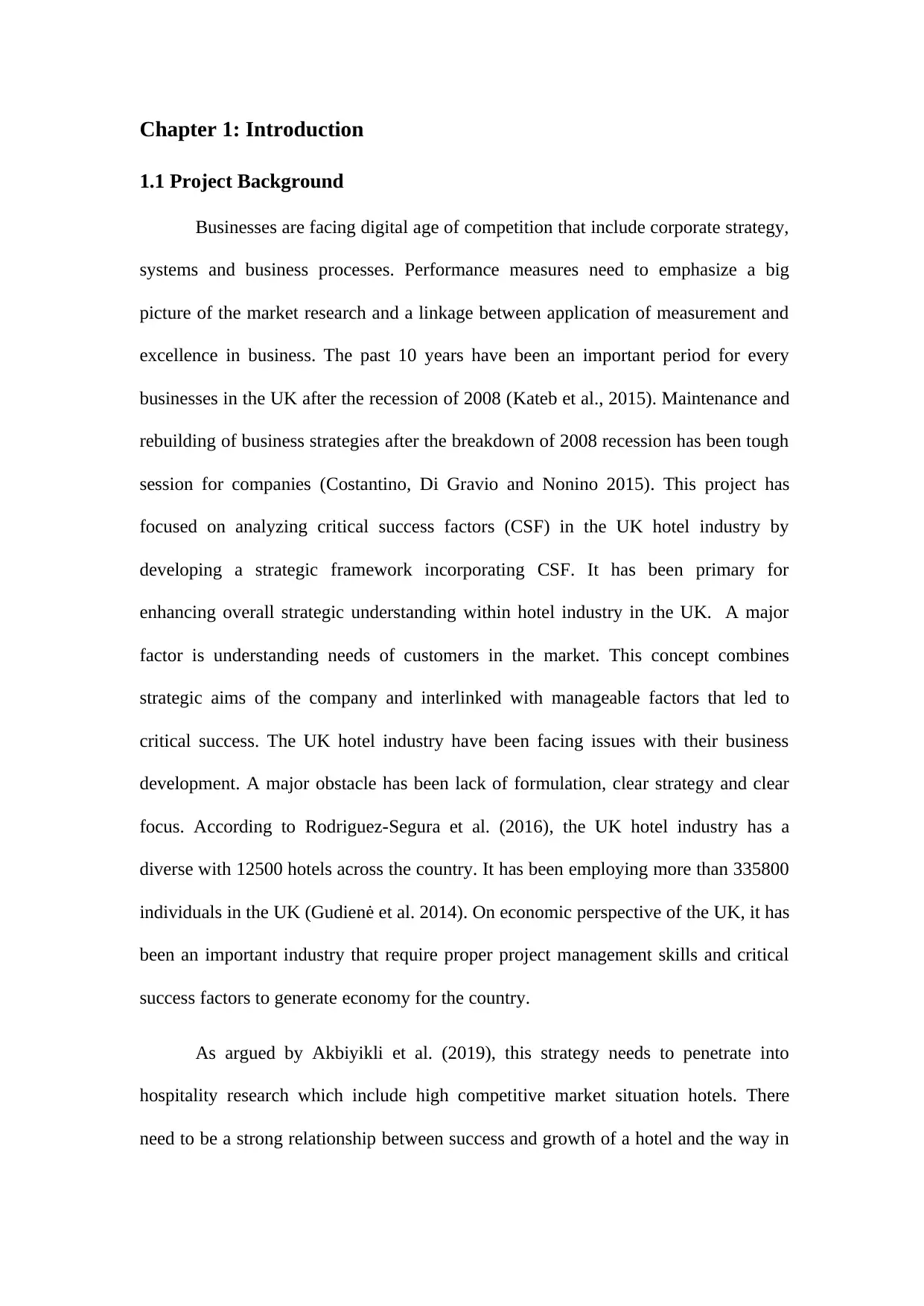
Chapter 1: Introduction
1.1 Project Background
Businesses are facing digital age of competition that include corporate strategy,
systems and business processes. Performance measures need to emphasize a big
picture of the market research and a linkage between application of measurement and
excellence in business. The past 10 years have been an important period for every
businesses in the UK after the recession of 2008 (Kateb et al., 2015). Maintenance and
rebuilding of business strategies after the breakdown of 2008 recession has been tough
session for companies (Costantino, Di Gravio and Nonino 2015). This project has
focused on analyzing critical success factors (CSF) in the UK hotel industry by
developing a strategic framework incorporating CSF. It has been primary for
enhancing overall strategic understanding within hotel industry in the UK. A major
factor is understanding needs of customers in the market. This concept combines
strategic aims of the company and interlinked with manageable factors that led to
critical success. The UK hotel industry have been facing issues with their business
development. A major obstacle has been lack of formulation, clear strategy and clear
focus. According to Rodriguez-Segura et al. (2016), the UK hotel industry has a
diverse with 12500 hotels across the country. It has been employing more than 335800
individuals in the UK (Gudienė et al. 2014). On economic perspective of the UK, it has
been an important industry that require proper project management skills and critical
success factors to generate economy for the country.
As argued by Akbiyikli et al. (2019), this strategy needs to penetrate into
hospitality research which include high competitive market situation hotels. There
need to be a strong relationship between success and growth of a hotel and the way in
1.1 Project Background
Businesses are facing digital age of competition that include corporate strategy,
systems and business processes. Performance measures need to emphasize a big
picture of the market research and a linkage between application of measurement and
excellence in business. The past 10 years have been an important period for every
businesses in the UK after the recession of 2008 (Kateb et al., 2015). Maintenance and
rebuilding of business strategies after the breakdown of 2008 recession has been tough
session for companies (Costantino, Di Gravio and Nonino 2015). This project has
focused on analyzing critical success factors (CSF) in the UK hotel industry by
developing a strategic framework incorporating CSF. It has been primary for
enhancing overall strategic understanding within hotel industry in the UK. A major
factor is understanding needs of customers in the market. This concept combines
strategic aims of the company and interlinked with manageable factors that led to
critical success. The UK hotel industry have been facing issues with their business
development. A major obstacle has been lack of formulation, clear strategy and clear
focus. According to Rodriguez-Segura et al. (2016), the UK hotel industry has a
diverse with 12500 hotels across the country. It has been employing more than 335800
individuals in the UK (Gudienė et al. 2014). On economic perspective of the UK, it has
been an important industry that require proper project management skills and critical
success factors to generate economy for the country.
As argued by Akbiyikli et al. (2019), this strategy needs to penetrate into
hospitality research which include high competitive market situation hotels. There
need to be a strong relationship between success and growth of a hotel and the way in
Paraphrase This Document
Need a fresh take? Get an instant paraphrase of this document with our AI Paraphraser
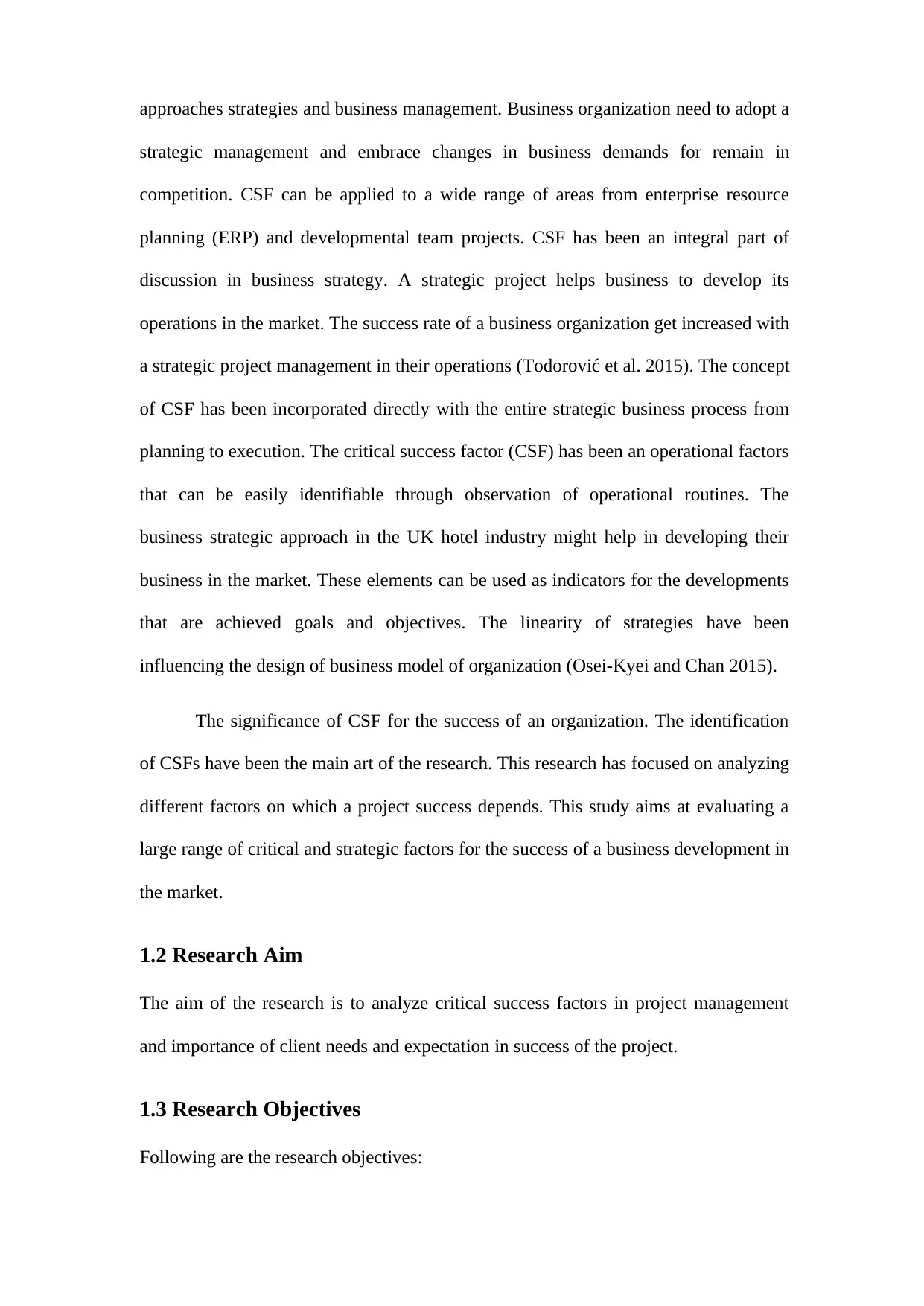
approaches strategies and business management. Business organization need to adopt a
strategic management and embrace changes in business demands for remain in
competition. CSF can be applied to a wide range of areas from enterprise resource
planning (ERP) and developmental team projects. CSF has been an integral part of
discussion in business strategy. A strategic project helps business to develop its
operations in the market. The success rate of a business organization get increased with
a strategic project management in their operations (Todorović et al. 2015). The concept
of CSF has been incorporated directly with the entire strategic business process from
planning to execution. The critical success factor (CSF) has been an operational factors
that can be easily identifiable through observation of operational routines. The
business strategic approach in the UK hotel industry might help in developing their
business in the market. These elements can be used as indicators for the developments
that are achieved goals and objectives. The linearity of strategies have been
influencing the design of business model of organization (Osei-Kyei and Chan 2015).
The significance of CSF for the success of an organization. The identification
of CSFs have been the main art of the research. This research has focused on analyzing
different factors on which a project success depends. This study aims at evaluating a
large range of critical and strategic factors for the success of a business development in
the market.
1.2 Research Aim
The aim of the research is to analyze critical success factors in project management
and importance of client needs and expectation in success of the project.
1.3 Research Objectives
Following are the research objectives:
strategic management and embrace changes in business demands for remain in
competition. CSF can be applied to a wide range of areas from enterprise resource
planning (ERP) and developmental team projects. CSF has been an integral part of
discussion in business strategy. A strategic project helps business to develop its
operations in the market. The success rate of a business organization get increased with
a strategic project management in their operations (Todorović et al. 2015). The concept
of CSF has been incorporated directly with the entire strategic business process from
planning to execution. The critical success factor (CSF) has been an operational factors
that can be easily identifiable through observation of operational routines. The
business strategic approach in the UK hotel industry might help in developing their
business in the market. These elements can be used as indicators for the developments
that are achieved goals and objectives. The linearity of strategies have been
influencing the design of business model of organization (Osei-Kyei and Chan 2015).
The significance of CSF for the success of an organization. The identification
of CSFs have been the main art of the research. This research has focused on analyzing
different factors on which a project success depends. This study aims at evaluating a
large range of critical and strategic factors for the success of a business development in
the market.
1.2 Research Aim
The aim of the research is to analyze critical success factors in project management
and importance of client needs and expectation in success of the project.
1.3 Research Objectives
Following are the research objectives:
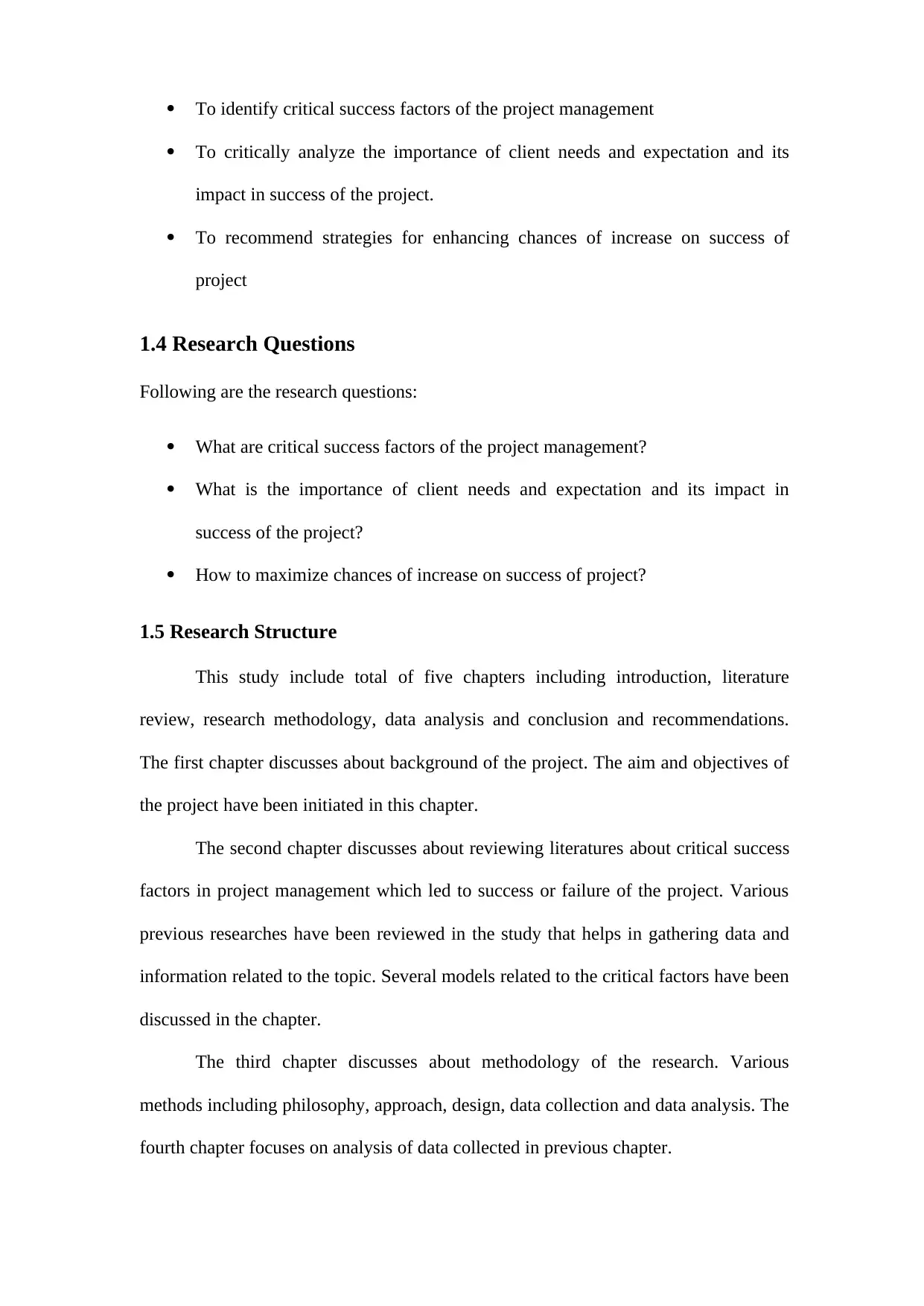
To identify critical success factors of the project management
To critically analyze the importance of client needs and expectation and its
impact in success of the project.
To recommend strategies for enhancing chances of increase on success of
project
1.4 Research Questions
Following are the research questions:
What are critical success factors of the project management?
What is the importance of client needs and expectation and its impact in
success of the project?
How to maximize chances of increase on success of project?
1.5 Research Structure
This study include total of five chapters including introduction, literature
review, research methodology, data analysis and conclusion and recommendations.
The first chapter discusses about background of the project. The aim and objectives of
the project have been initiated in this chapter.
The second chapter discusses about reviewing literatures about critical success
factors in project management which led to success or failure of the project. Various
previous researches have been reviewed in the study that helps in gathering data and
information related to the topic. Several models related to the critical factors have been
discussed in the chapter.
The third chapter discusses about methodology of the research. Various
methods including philosophy, approach, design, data collection and data analysis. The
fourth chapter focuses on analysis of data collected in previous chapter.
To critically analyze the importance of client needs and expectation and its
impact in success of the project.
To recommend strategies for enhancing chances of increase on success of
project
1.4 Research Questions
Following are the research questions:
What are critical success factors of the project management?
What is the importance of client needs and expectation and its impact in
success of the project?
How to maximize chances of increase on success of project?
1.5 Research Structure
This study include total of five chapters including introduction, literature
review, research methodology, data analysis and conclusion and recommendations.
The first chapter discusses about background of the project. The aim and objectives of
the project have been initiated in this chapter.
The second chapter discusses about reviewing literatures about critical success
factors in project management which led to success or failure of the project. Various
previous researches have been reviewed in the study that helps in gathering data and
information related to the topic. Several models related to the critical factors have been
discussed in the chapter.
The third chapter discusses about methodology of the research. Various
methods including philosophy, approach, design, data collection and data analysis. The
fourth chapter focuses on analysis of data collected in previous chapter.
⊘ This is a preview!⊘
Do you want full access?
Subscribe today to unlock all pages.

Trusted by 1+ million students worldwide

The fifth chapter discusses about conclusion and recommendation of the whole
study done on the topic.
study done on the topic.
Paraphrase This Document
Need a fresh take? Get an instant paraphrase of this document with our AI Paraphraser
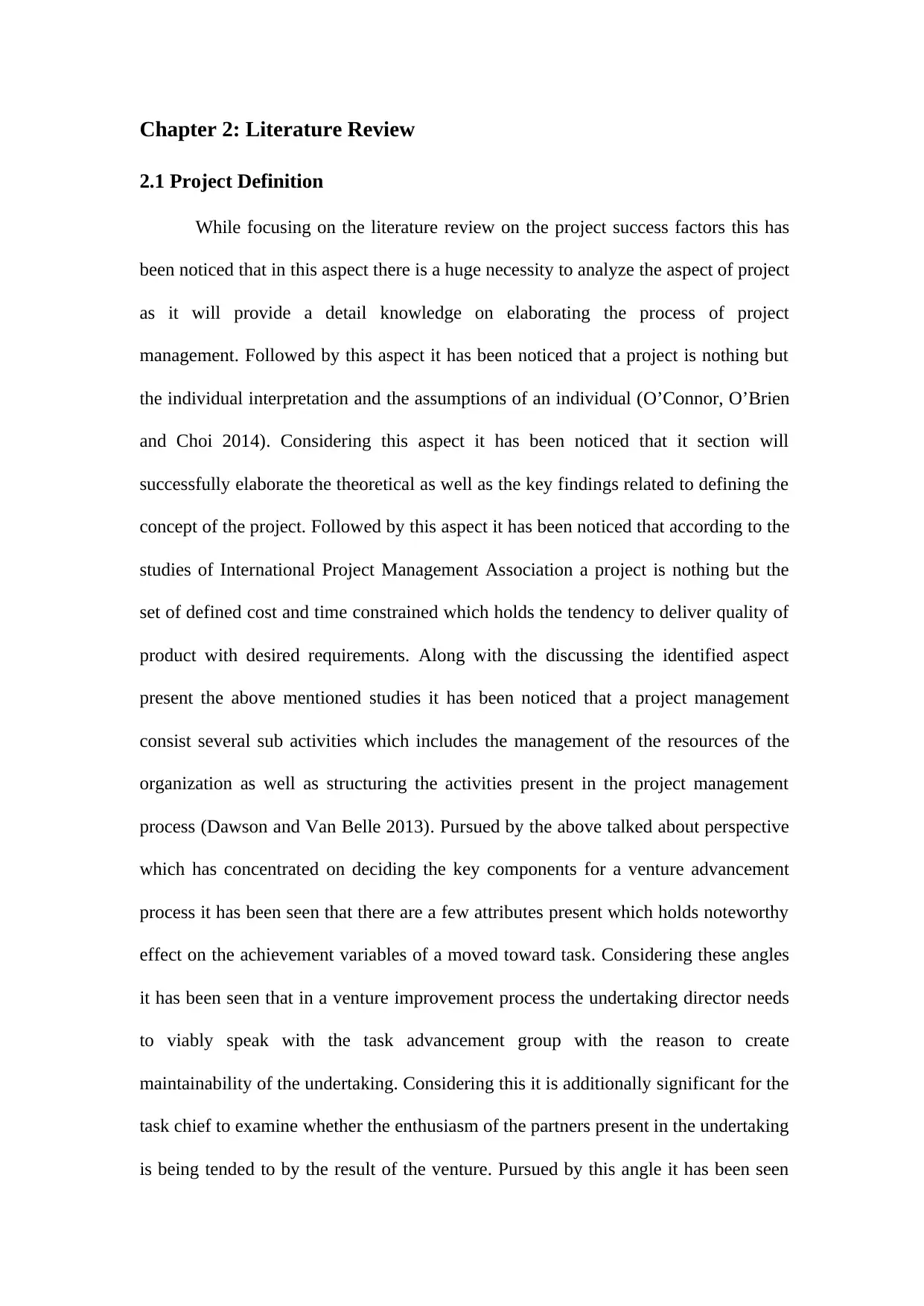
Chapter 2: Literature Review
2.1 Project Definition
While focusing on the literature review on the project success factors this has
been noticed that in this aspect there is a huge necessity to analyze the aspect of project
as it will provide a detail knowledge on elaborating the process of project
management. Followed by this aspect it has been noticed that a project is nothing but
the individual interpretation and the assumptions of an individual (O’Connor, O’Brien
and Choi 2014). Considering this aspect it has been noticed that it section will
successfully elaborate the theoretical as well as the key findings related to defining the
concept of the project. Followed by this aspect it has been noticed that according to the
studies of International Project Management Association a project is nothing but the
set of defined cost and time constrained which holds the tendency to deliver quality of
product with desired requirements. Along with the discussing the identified aspect
present the above mentioned studies it has been noticed that a project management
consist several sub activities which includes the management of the resources of the
organization as well as structuring the activities present in the project management
process (Dawson and Van Belle 2013). Pursued by the above talked about perspective
which has concentrated on deciding the key components for a venture advancement
process it has been seen that there are a few attributes present which holds noteworthy
effect on the achievement variables of a moved toward task. Considering these angles
it has been seen that in a venture improvement process the undertaking director needs
to viably speak with the task advancement group with the reason to create
maintainability of the undertaking. Considering this it is additionally significant for the
task chief to examine whether the enthusiasm of the partners present in the undertaking
is being tended to by the result of the venture. Pursued by this angle it has been seen
2.1 Project Definition
While focusing on the literature review on the project success factors this has
been noticed that in this aspect there is a huge necessity to analyze the aspect of project
as it will provide a detail knowledge on elaborating the process of project
management. Followed by this aspect it has been noticed that a project is nothing but
the individual interpretation and the assumptions of an individual (O’Connor, O’Brien
and Choi 2014). Considering this aspect it has been noticed that it section will
successfully elaborate the theoretical as well as the key findings related to defining the
concept of the project. Followed by this aspect it has been noticed that according to the
studies of International Project Management Association a project is nothing but the
set of defined cost and time constrained which holds the tendency to deliver quality of
product with desired requirements. Along with the discussing the identified aspect
present the above mentioned studies it has been noticed that a project management
consist several sub activities which includes the management of the resources of the
organization as well as structuring the activities present in the project management
process (Dawson and Van Belle 2013). Pursued by the above talked about perspective
which has concentrated on deciding the key components for a venture advancement
process it has been seen that there are a few attributes present which holds noteworthy
effect on the achievement variables of a moved toward task. Considering these angles
it has been seen that in a venture improvement process the undertaking director needs
to viably speak with the task advancement group with the reason to create
maintainability of the undertaking. Considering this it is additionally significant for the
task chief to examine whether the enthusiasm of the partners present in the undertaking
is being tended to by the result of the venture. Pursued by this angle it has been seen
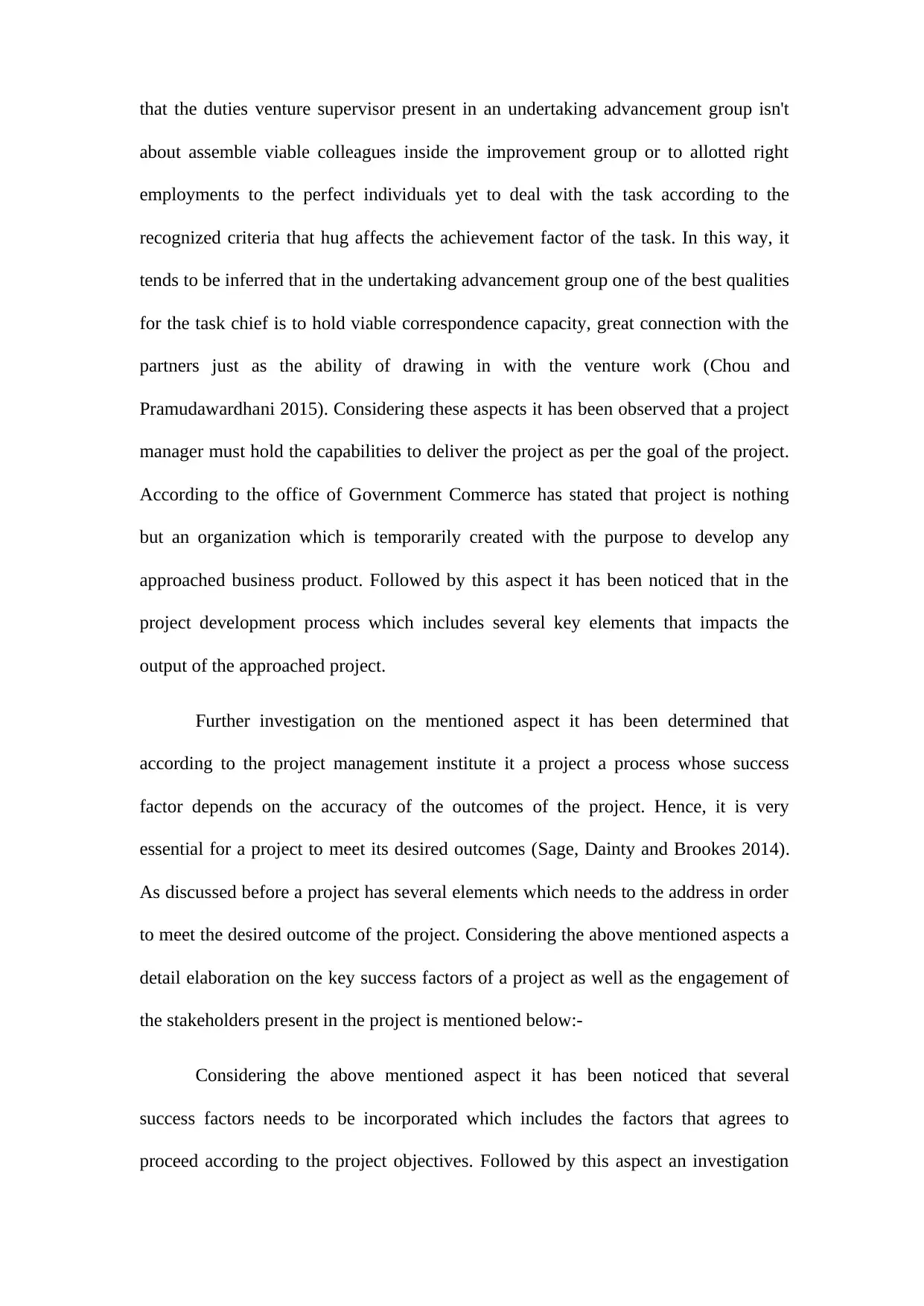
that the duties venture supervisor present in an undertaking advancement group isn't
about assemble viable colleagues inside the improvement group or to allotted right
employments to the perfect individuals yet to deal with the task according to the
recognized criteria that hug affects the achievement factor of the task. In this way, it
tends to be inferred that in the undertaking advancement group one of the best qualities
for the task chief is to hold viable correspondence capacity, great connection with the
partners just as the ability of drawing in with the venture work (Chou and
Pramudawardhani 2015). Considering these aspects it has been observed that a project
manager must hold the capabilities to deliver the project as per the goal of the project.
According to the office of Government Commerce has stated that project is nothing
but an organization which is temporarily created with the purpose to develop any
approached business product. Followed by this aspect it has been noticed that in the
project development process which includes several key elements that impacts the
output of the approached project.
Further investigation on the mentioned aspect it has been determined that
according to the project management institute it a project a process whose success
factor depends on the accuracy of the outcomes of the project. Hence, it is very
essential for a project to meet its desired outcomes (Sage, Dainty and Brookes 2014).
As discussed before a project has several elements which needs to the address in order
to meet the desired outcome of the project. Considering the above mentioned aspects a
detail elaboration on the key success factors of a project as well as the engagement of
the stakeholders present in the project is mentioned below:-
Considering the above mentioned aspect it has been noticed that several
success factors needs to be incorporated which includes the factors that agrees to
proceed according to the project objectives. Followed by this aspect an investigation
about assemble viable colleagues inside the improvement group or to allotted right
employments to the perfect individuals yet to deal with the task according to the
recognized criteria that hug affects the achievement factor of the task. In this way, it
tends to be inferred that in the undertaking advancement group one of the best qualities
for the task chief is to hold viable correspondence capacity, great connection with the
partners just as the ability of drawing in with the venture work (Chou and
Pramudawardhani 2015). Considering these aspects it has been observed that a project
manager must hold the capabilities to deliver the project as per the goal of the project.
According to the office of Government Commerce has stated that project is nothing
but an organization which is temporarily created with the purpose to develop any
approached business product. Followed by this aspect it has been noticed that in the
project development process which includes several key elements that impacts the
output of the approached project.
Further investigation on the mentioned aspect it has been determined that
according to the project management institute it a project a process whose success
factor depends on the accuracy of the outcomes of the project. Hence, it is very
essential for a project to meet its desired outcomes (Sage, Dainty and Brookes 2014).
As discussed before a project has several elements which needs to the address in order
to meet the desired outcome of the project. Considering the above mentioned aspects a
detail elaboration on the key success factors of a project as well as the engagement of
the stakeholders present in the project is mentioned below:-
Considering the above mentioned aspect it has been noticed that several
success factors needs to be incorporated which includes the factors that agrees to
proceed according to the project objectives. Followed by this aspect an investigation
⊘ This is a preview!⊘
Do you want full access?
Subscribe today to unlock all pages.

Trusted by 1+ million students worldwide
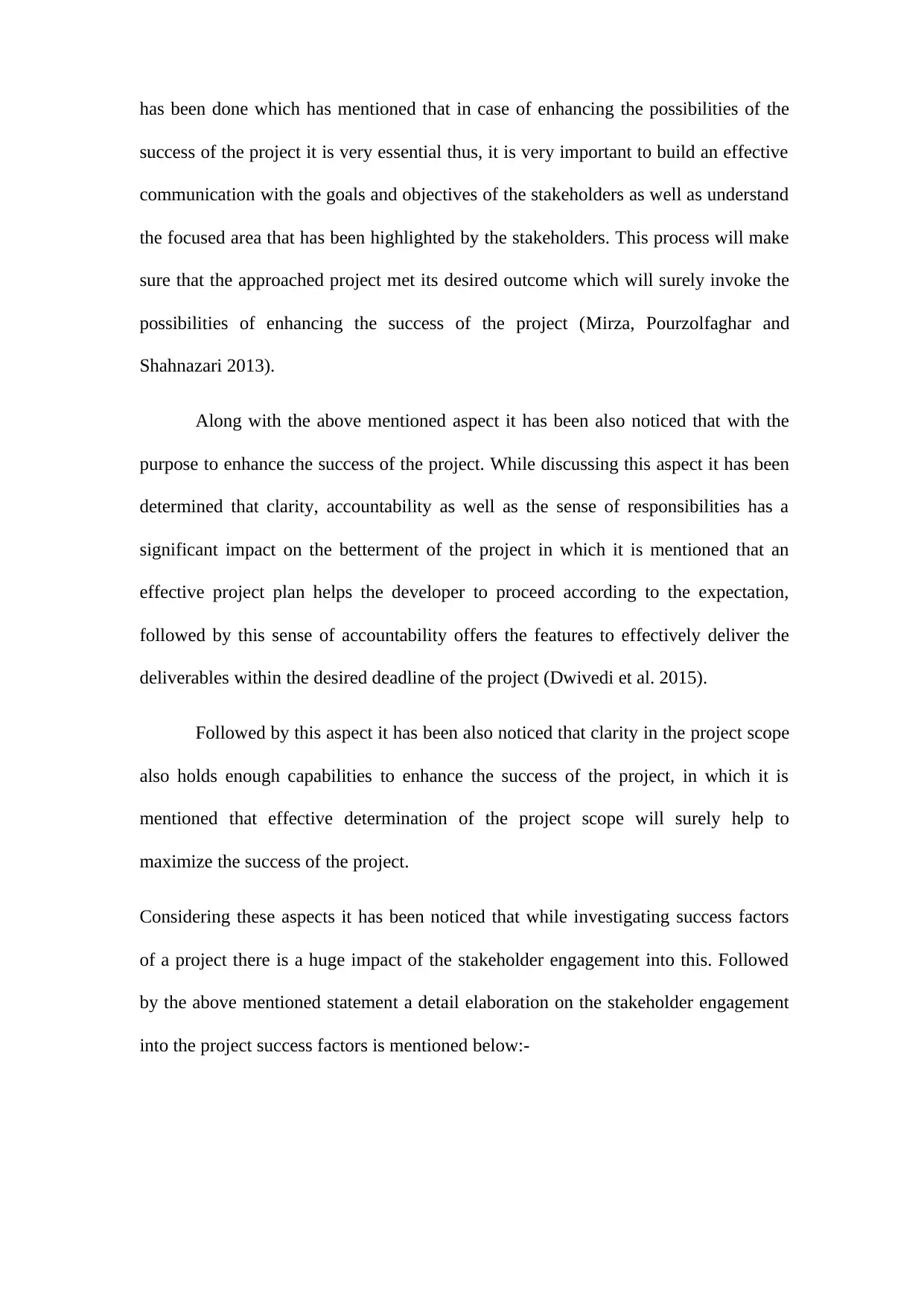
has been done which has mentioned that in case of enhancing the possibilities of the
success of the project it is very essential thus, it is very important to build an effective
communication with the goals and objectives of the stakeholders as well as understand
the focused area that has been highlighted by the stakeholders. This process will make
sure that the approached project met its desired outcome which will surely invoke the
possibilities of enhancing the success of the project (Mirza, Pourzolfaghar and
Shahnazari 2013).
Along with the above mentioned aspect it has been also noticed that with the
purpose to enhance the success of the project. While discussing this aspect it has been
determined that clarity, accountability as well as the sense of responsibilities has a
significant impact on the betterment of the project in which it is mentioned that an
effective project plan helps the developer to proceed according to the expectation,
followed by this sense of accountability offers the features to effectively deliver the
deliverables within the desired deadline of the project (Dwivedi et al. 2015).
Followed by this aspect it has been also noticed that clarity in the project scope
also holds enough capabilities to enhance the success of the project, in which it is
mentioned that effective determination of the project scope will surely help to
maximize the success of the project.
Considering these aspects it has been noticed that while investigating success factors
of a project there is a huge impact of the stakeholder engagement into this. Followed
by the above mentioned statement a detail elaboration on the stakeholder engagement
into the project success factors is mentioned below:-
success of the project it is very essential thus, it is very important to build an effective
communication with the goals and objectives of the stakeholders as well as understand
the focused area that has been highlighted by the stakeholders. This process will make
sure that the approached project met its desired outcome which will surely invoke the
possibilities of enhancing the success of the project (Mirza, Pourzolfaghar and
Shahnazari 2013).
Along with the above mentioned aspect it has been also noticed that with the
purpose to enhance the success of the project. While discussing this aspect it has been
determined that clarity, accountability as well as the sense of responsibilities has a
significant impact on the betterment of the project in which it is mentioned that an
effective project plan helps the developer to proceed according to the expectation,
followed by this sense of accountability offers the features to effectively deliver the
deliverables within the desired deadline of the project (Dwivedi et al. 2015).
Followed by this aspect it has been also noticed that clarity in the project scope
also holds enough capabilities to enhance the success of the project, in which it is
mentioned that effective determination of the project scope will surely help to
maximize the success of the project.
Considering these aspects it has been noticed that while investigating success factors
of a project there is a huge impact of the stakeholder engagement into this. Followed
by the above mentioned statement a detail elaboration on the stakeholder engagement
into the project success factors is mentioned below:-
Paraphrase This Document
Need a fresh take? Get an instant paraphrase of this document with our AI Paraphraser
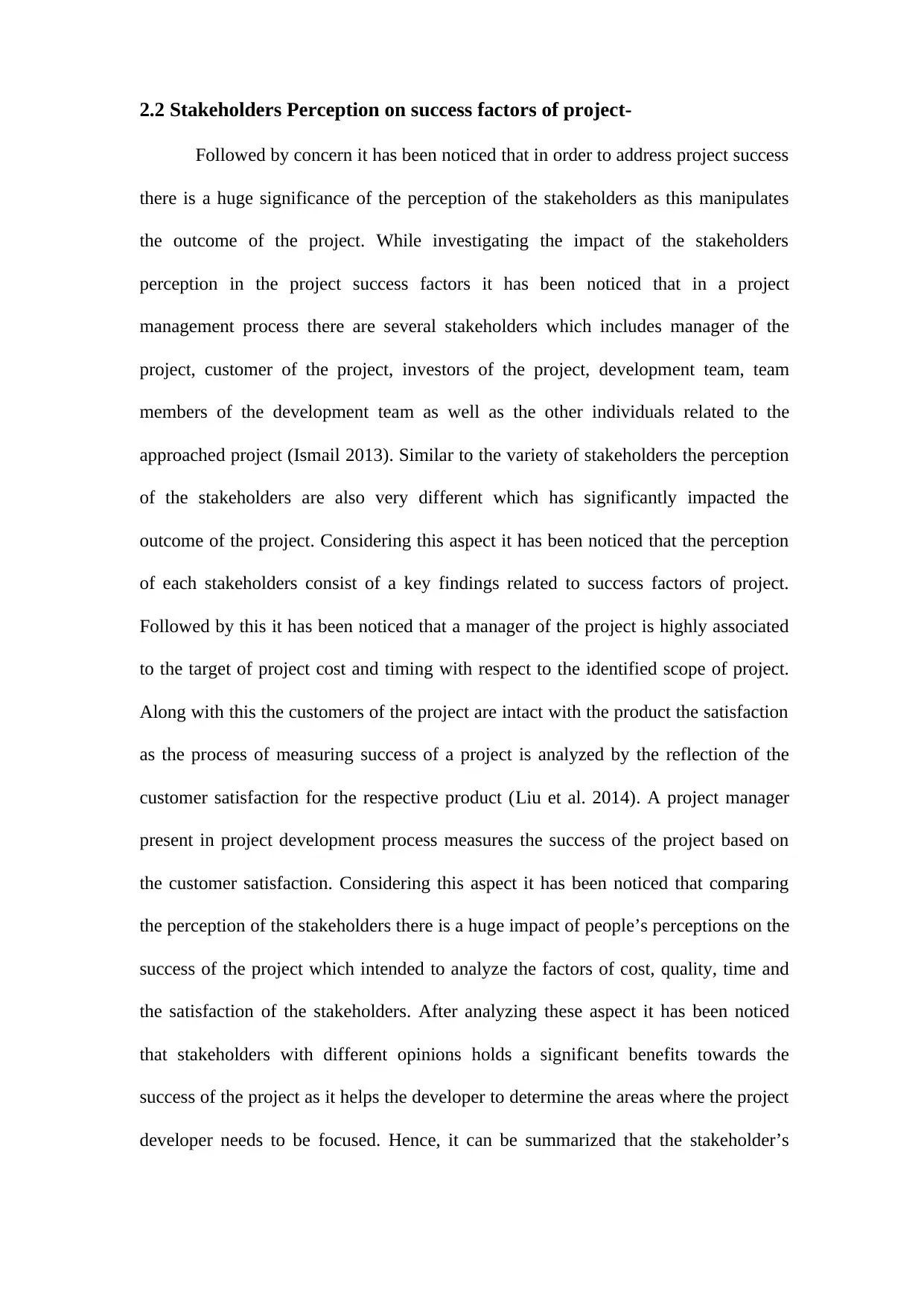
2.2 Stakeholders Perception on success factors of project-
Followed by concern it has been noticed that in order to address project success
there is a huge significance of the perception of the stakeholders as this manipulates
the outcome of the project. While investigating the impact of the stakeholders
perception in the project success factors it has been noticed that in a project
management process there are several stakeholders which includes manager of the
project, customer of the project, investors of the project, development team, team
members of the development team as well as the other individuals related to the
approached project (Ismail 2013). Similar to the variety of stakeholders the perception
of the stakeholders are also very different which has significantly impacted the
outcome of the project. Considering this aspect it has been noticed that the perception
of each stakeholders consist of a key findings related to success factors of project.
Followed by this it has been noticed that a manager of the project is highly associated
to the target of project cost and timing with respect to the identified scope of project.
Along with this the customers of the project are intact with the product the satisfaction
as the process of measuring success of a project is analyzed by the reflection of the
customer satisfaction for the respective product (Liu et al. 2014). A project manager
present in project development process measures the success of the project based on
the customer satisfaction. Considering this aspect it has been noticed that comparing
the perception of the stakeholders there is a huge impact of people’s perceptions on the
success of the project which intended to analyze the factors of cost, quality, time and
the satisfaction of the stakeholders. After analyzing these aspect it has been noticed
that stakeholders with different opinions holds a significant benefits towards the
success of the project as it helps the developer to determine the areas where the project
developer needs to be focused. Hence, it can be summarized that the stakeholder’s
Followed by concern it has been noticed that in order to address project success
there is a huge significance of the perception of the stakeholders as this manipulates
the outcome of the project. While investigating the impact of the stakeholders
perception in the project success factors it has been noticed that in a project
management process there are several stakeholders which includes manager of the
project, customer of the project, investors of the project, development team, team
members of the development team as well as the other individuals related to the
approached project (Ismail 2013). Similar to the variety of stakeholders the perception
of the stakeholders are also very different which has significantly impacted the
outcome of the project. Considering this aspect it has been noticed that the perception
of each stakeholders consist of a key findings related to success factors of project.
Followed by this it has been noticed that a manager of the project is highly associated
to the target of project cost and timing with respect to the identified scope of project.
Along with this the customers of the project are intact with the product the satisfaction
as the process of measuring success of a project is analyzed by the reflection of the
customer satisfaction for the respective product (Liu et al. 2014). A project manager
present in project development process measures the success of the project based on
the customer satisfaction. Considering this aspect it has been noticed that comparing
the perception of the stakeholders there is a huge impact of people’s perceptions on the
success of the project which intended to analyze the factors of cost, quality, time and
the satisfaction of the stakeholders. After analyzing these aspect it has been noticed
that stakeholders with different opinions holds a significant benefits towards the
success of the project as it helps the developer to determine the areas where the project
developer needs to be focused. Hence, it can be summarized that the stakeholder’s
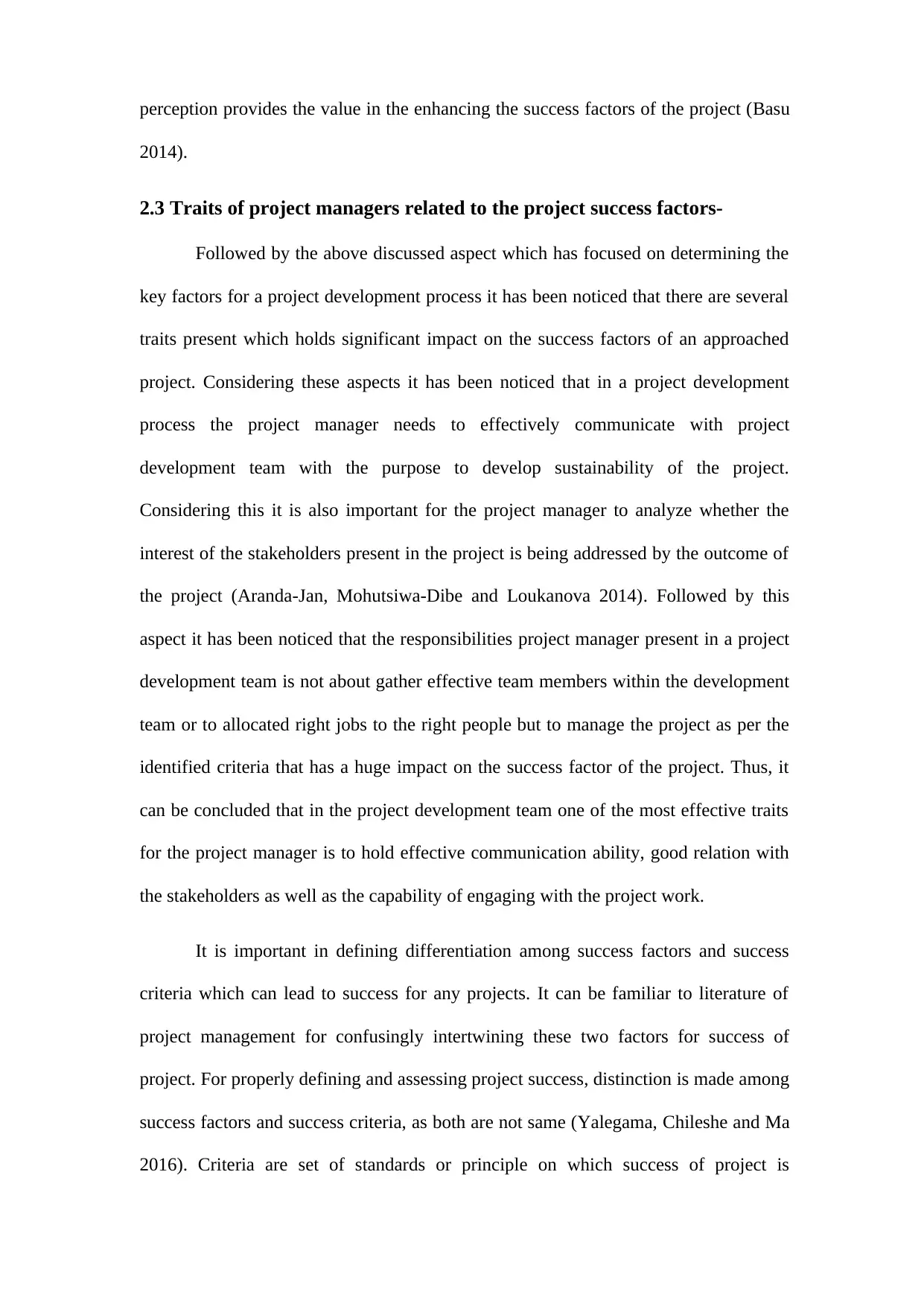
perception provides the value in the enhancing the success factors of the project (Basu
2014).
2.3 Traits of project managers related to the project success factors-
Followed by the above discussed aspect which has focused on determining the
key factors for a project development process it has been noticed that there are several
traits present which holds significant impact on the success factors of an approached
project. Considering these aspects it has been noticed that in a project development
process the project manager needs to effectively communicate with project
development team with the purpose to develop sustainability of the project.
Considering this it is also important for the project manager to analyze whether the
interest of the stakeholders present in the project is being addressed by the outcome of
the project (Aranda-Jan, Mohutsiwa-Dibe and Loukanova 2014). Followed by this
aspect it has been noticed that the responsibilities project manager present in a project
development team is not about gather effective team members within the development
team or to allocated right jobs to the right people but to manage the project as per the
identified criteria that has a huge impact on the success factor of the project. Thus, it
can be concluded that in the project development team one of the most effective traits
for the project manager is to hold effective communication ability, good relation with
the stakeholders as well as the capability of engaging with the project work.
It is important in defining differentiation among success factors and success
criteria which can lead to success for any projects. It can be familiar to literature of
project management for confusingly intertwining these two factors for success of
project. For properly defining and assessing project success, distinction is made among
success factors and success criteria, as both are not same (Yalegama, Chileshe and Ma
2016). Criteria are set of standards or principle on which success of project is
2014).
2.3 Traits of project managers related to the project success factors-
Followed by the above discussed aspect which has focused on determining the
key factors for a project development process it has been noticed that there are several
traits present which holds significant impact on the success factors of an approached
project. Considering these aspects it has been noticed that in a project development
process the project manager needs to effectively communicate with project
development team with the purpose to develop sustainability of the project.
Considering this it is also important for the project manager to analyze whether the
interest of the stakeholders present in the project is being addressed by the outcome of
the project (Aranda-Jan, Mohutsiwa-Dibe and Loukanova 2014). Followed by this
aspect it has been noticed that the responsibilities project manager present in a project
development team is not about gather effective team members within the development
team or to allocated right jobs to the right people but to manage the project as per the
identified criteria that has a huge impact on the success factor of the project. Thus, it
can be concluded that in the project development team one of the most effective traits
for the project manager is to hold effective communication ability, good relation with
the stakeholders as well as the capability of engaging with the project work.
It is important in defining differentiation among success factors and success
criteria which can lead to success for any projects. It can be familiar to literature of
project management for confusingly intertwining these two factors for success of
project. For properly defining and assessing project success, distinction is made among
success factors and success criteria, as both are not same (Yalegama, Chileshe and Ma
2016). Criteria are set of standards or principle on which success of project is
⊘ This is a preview!⊘
Do you want full access?
Subscribe today to unlock all pages.

Trusted by 1+ million students worldwide
1 out of 70
Related Documents
Your All-in-One AI-Powered Toolkit for Academic Success.
+13062052269
info@desklib.com
Available 24*7 on WhatsApp / Email
![[object Object]](/_next/static/media/star-bottom.7253800d.svg)
Unlock your academic potential
Copyright © 2020–2026 A2Z Services. All Rights Reserved. Developed and managed by ZUCOL.





